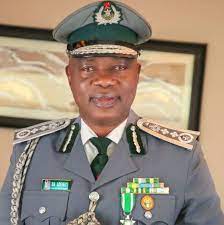Deputy President, National Association of Government Approve Freight Forwarders (NAGAFF), Dr Segun Musa, has called for adequate and consistent government policy to drive the Nigerian maritime sector.
Musa made the call in an interview on Thursday in Lagos.
“Nigeria can never advance beyond where we are, if adequate and consistent policy to drive our transport industry and our maritime aviation industry is not put in place.
“Unfortunately, it is only in this part of the world that we drive our industries with myopic ideas and probably sustained articles in foreign magazines, articles that have failed in developed countries.
“It is only in this part of the world that people just bring policies, and when the policy noose dived, nobody called them to come and account for it.
“We need to have the kind of maritime industry we are looking at for the 21st century maritime industry,” he said.
Musa, also said that Nigeria needs to have the right people in place, starting from the Minister, and that a Minister of Transportation should be somebody that is a specialist in the transportation sector.
“This is because maritime is a specialised sector that needs critical and innovative thinkers with creative ideas and skills,” he said.
The deputy president of the association said government needs to look at people that know their onions and are core practitioners in those sectors.
“People that have passion for developing those sectors, appoint such people into positions and not using positions for compensations,” Musa said.
He said appointing wrong person was just like mortgaging the future of so many investors that have invested their lives, hard earned investment in the business within those sectors.
“Again, government needs to deregulate the maritime sector, especially the ports needs to be deregulated.
“The ports are already congested, because the activities of clearing, imports and exports at the ports, within that Apapa corridor and as businesses are growing and expanding, in bound and out bound cargo.
“Traffic is increasing, but government is not actually working with statistics to check the impact of the increase in traffic, both in bound and out bound.
“Government still want to continue managing the already overstretched corridor to manage the increase in the traffic, knowing well, even before parts of the ports were concessioned,” Musa said.
He said that the ports were concessioned to industries like Dangote, BUA among others, and they were already congested, and under the supervision of the Nigeria Ports Authority (NPA).
“We are bringing manufacturing company into the ports, there is different between manufacturing company and ports.
“But now, the ports are choked and the traffic is increasing and government has never taught of building other ports in other corridors like Epe, Ikorodu, Badagry, like other areas.
“You plan maritime with expansion, improvement in infrastructure, expanding the frontiers of that corridor, that is how to plan for maritime.
“Maritime is not just being planned within a small confined enclave or environment,” the deputy president said.
Musa said that when talking about maritime, we were talking about inter modal support, in the sense that you don’t allow only haulage to pilot the traffic.
“You consider all other alternatives like rail, badges, boats to traffic the shipping of cargo within the corridor,” he said.
The deputy president said that when you allow only haulage, the roads would not last, regardless of how much you invested on the roads.
According to him, essence of road haulage is just to complement the rail and probably the badges and small boats.
“We also need to look at the industrialisation of Nigeria, if we are truly interested in industrialising Nigeria.
“We should be looking at an era where the road will be designed in such a way that specialised cargo, awkward cargo, high volume and weight project cargo will have access from the port to the final destination.
“We are talking about shipping of hundreds of tons and we don’t have a road that can actually accommodate it.
“We have pedestrian bridges, that are not actually erected in such a way that will be able to pilot those cargoes, either by rail or by road transportation.
“These are things that has actually discourage a lot of cargo project equipment that would have landed in this country,” he said.
















Discussion about this post